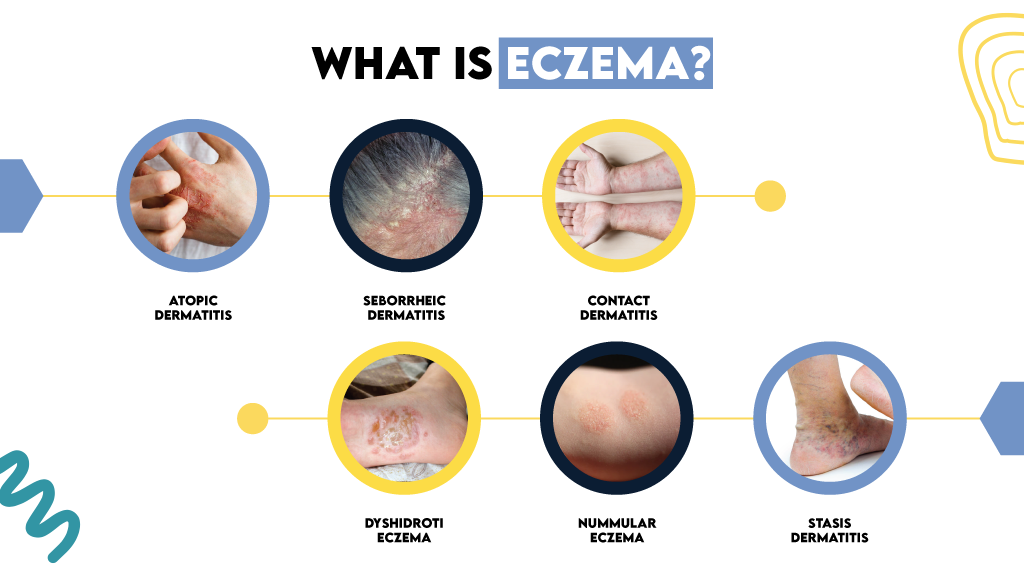Can Stress Cause Eczema? How Anxiety & Poor Sleep Trigger Flare-Ups

Eczema, although it is more common among children under the age of 5, can affect anyone at any age. If you have been dealing with chronic eczema for years, you may have noticed that your eczema symptoms often become worse when you are dealing with emotional stress or anxiety. You may have thought to yourself, “Can stress cause eczema?”
Don’t worry, it’s not just you; many people who don’t have eczema also wonder if stress can cause eczema. This is why we decided to write this blog and clear all your misconceptions about stress-related eczema. And provide you with insight into how following a skincare routine that includes the use of an eczema body wash and eczema cream by Dermal Defense can help manage your condition.
What is Eczema?

Eczema is a chronic inflammatory skin condition that causes red, itchy, dry, irritated rashes on the skin. Although the term “eczema” is often used interchangeably with “atopic dermatitis,” it is a broad term that encompasses many types of eczema.
Some of the most common types of eczema are:
- Atopic dermatitis
- Seborrheic dermatitis
- Contact dermatitis
- Dyshidrotic eczema
- Nummular eczema
- Stasis Dermatitis
Even though there are different types of eczema, the symptoms are usually the same; itching and dryness are always there.
Can Stress Cause Eczema?
Now, let’s come to the point: does stress cause eczema? The answer to this question is somewhat complicated, as stress cannot directly cause eczema; however, it can make your existing eczema symptoms worse or trigger a flare-up. Eczema, according to researchers, is believed to be caused by a combination of factors such as:
Genetics
People who have a family history of atopic dermatitis, asthma, allergies, and hay fever are more likely to experience eczema. Some people may also have a genetically weak natural skin barrier, making them more prone to developing it.
Skin Barrier Dysfunction
Our skin contains a natural barrier that helps retain moisture in the skin and protect it against outside irritants. However, people with skin barrier dysfunction, which means the barrier is unable to fulfill its responsibilities, are more prone to eczema.
Environmental Triggers
Due to a weak skin barrier, outside irritants or environmental triggers can easily affect or cause a reaction on the skin and lead to an eczema flare-up.
Does Stress Cause Eczema Flare Ups?
The answer to your question, “Can stress cause eczema to flare up?” is yes. Eczema can trigger or exacerbate an eczema flare-up. According to a survey on a blog of the National Eczema Society
, stress is one of the biggest triggers of a flare-up.
You might be wondering how. Well, even the scientists are unable to find its exact connection yet. However, most of the researchers
believe that stress can affect certain chemicals in the body that can trigger inflammation on the skin and weaken its protective barrier.
Now we know that stress is one of the reasons for eczema to flare up; let’s learn about some other common triggers.
What is eczema triggered by?
Some other factors can also play a part in triggering or worsening your eczema, such as
- Harsh chemicals in skin or household products
- Fragrance
- Pollution and dust
- Cigarette smoke
- Certain fabrics
- Metal
- Pollen
- Pet dander
- Poison ivy
- Extreme weather conditions
- Dry skin
The list of factors that might trigger eczema is very long; however, we have mentioned some of the most common ones. Additionally, the factors may vary from person to person.
What Does Stress Eczema Look Like?

Now you might be thinking, what does stress-induced eczema look like? It looks pretty much like what an eczema rash looks like. Some of the eczema symptoms that you may notice on your skin are:
- Itchy skin
- Irritation
- Skin flaking and cracking
- Dry skin
- Redness
- Rashes on the skin
- Inflammation
- Skin oozing and crusting (in severe eczema cases)
You may also notice that if you are already experiencing a flare-up, then due to stress, your symptoms, especially the itching and dryness, become worse.
How Do Anxiety and Poor Sleep Trigger Eczema?
Now we know that stress can trigger eczema, but can anxiety and poor sleep cause it too? The answer is yes. Anxiety is considered a form of emotional stress. Poor sleep and emotional stress have a direct relationship.
So both these factors can trigger an eczema flare-up or make one worse. But how?
Anxiety and Eczema
Anxiety and eczema go around and around in a circle. One can make the other one worse. When you are experiencing anxiety, your body releases certain types of hormones, such as cortisol.
The cortisol can suppress your immune system and weaken the skin barrier. Additionally, it can trigger inflammation in the body, which makes your existing skin inflammation and eczema symptoms worse.
Poor Sleep and Eczema
Just like anxiety, poor sleep, and eczema have a never-ending relationship. An eczema flare-up often leads to poor sleep due to the intense itching and irritation. And poor sleep can actually make your eczema worse.
Because sleep isn’t only about resting, it’s about your body healing and regenerating, so poor sleep affects your condition in various ways:
- It prevents the skin’s natural barrier from repairing properly, which makes the skin more sensitive.
- Sleep deprivation can lead to excessive moisture loss, resulting in dryness and irritation.
- Lack of sleep can also exacerbate skin and body inflammation, which worsens the redness and itching associated with eczema.
Stress Eczema Treatment

No matter what causes or triggers your eczema, the first thing you would want if you are experiencing it is to know how to get rid of eczema. Even though there is no permanent cure for eczema however you can manage it effectively by making a few lifestyle changes, such as.
Follow an Eczema Skincare Routine
We know that your skin becomes extra sensitive, itchy, dry, and irritated due to eczema. This is why following a proper skincare routine with the help of the right products can not only help your skin become healthy but also restore the skin barrier and prevent future flare-ups.
The two steps you must add to your daily skincare routine are:
Step 1: Cleanse
The first step is cleansing to remove all the dirt, bacteria, and irritants from the skin. Use a fragrance-free body wash like Dermal Defense Sensitive Skin Body Wash to cleanse your skin, focusing more on the affected areas at least once daily.
Dermal Defense is specially formulated by Dr. Eddie with sensitive, eczema-prone skin in mind. This is why it’s fragrance-free, hypoallergenic, low pH, and non-soap, making it a great option for dry, itchy, eczema-prone skin.
Step 2: Moisturize
The next step in your routine should be to moisturize the skin with an eczema moisturizing cream. Moisturize your skin immediately after washing it, while the skin is still a little damp, because it is able to retain more moisture at that time.
Apart from that, use it twice daily to get the best results. However, not every moisturizing cream or lotion can help you because they often contain harsh chemicals that can further exacerbate your eczema.
This is why you should choose a skin-friendly cream like the Dermal Defense Eczema Moisturizing Cream, which is fragrance-free, sulfate-free, paraben-free, dye-free, fast-absorbing, and non-greasy.
Plus, it is infused with ingredients like glycerin, snow-white petrolatum, and Phenoxyethanol that help keep hydrate and nourish your skin and soothe the itching and irritation associated with eczema.
Manage Stress
When you know that stress is one of your main culprits or triggers that make your eczema worse, then managing it can help soothe the symptoms. But how can you manage stress? Here is how:
- Exercise regularly; this helps release various hormones that help your body and mind relax.
- Try deep breathing techniques when you are in a stressful situation or experiencing anxiety.
- Do yoga to help your mind relax.
- Do the things that make you feel good and relaxed; it can be spending time with loved ones, painting, or anything else.
Avoid the Triggers
If you know that other factors, such as harsh chemicals in skincare products or harsh fabrics, along with stress, make your eczema worse, try avoiding them as much as possible. And if you don’t know about your triggers, then consult a doctor; they will be able to help you figure them out.
Improve Sleep
As we have discussed before, poor sleep can exacerbate your symptoms; this is why getting a good night’s sleep of at least 8 hours becomes even more essential. Try to avoid using your cell phone or any other screen before bedtime, as it can disrupt your sleep cycle.
You can also try peaceful soothing sounds or a sunrise lamp in a dark room to help you sleep better.
Conclusion
Stress cannot directly cause eczema; however, it can trigger an eczema flare-up or make your existing eczema symptoms worse. So managing stress is very essential for reducing the intensity of symptoms caused by stress eczema.
However, along with managing stress, it is also essential to follow a proper eczema skin care routine that includes using an eczema cleanser to cleanse your skin and a moisturizing cream for eczema to keep your skin hydrated.
FAQs
1 Can stress make eczema worse?
Yes, stress can trigger the release of certain chemicals and hormones in the body that can weaken the skin barrier, increase inflammation in the body, and exacerbate eczema symptoms.
2 Can eczema be caused by anxiety?
No, eczema cannot be directly caused by anxiety. However, anxiety can trigger an eczema flare-up or worsen your eczema symptoms.
3 How do you get rid of stress induced eczema?
The best way to manage stress-related eczema is by managing your stress with the help of exercise, yoga, walking, and deep breathing techniques. Along with that, use the Dermal Defense Eczema Skincare Bundle to help soothe the itching, dryness, redness, and irritation associated with eczema.
4 How long does stress eczmea last?
It may vary from person to person; for some, it may last a few days, while for others, it may last a few weeks, depending on the duration of the stress.
5 Can anti-anxiety medication help eczema?
If your eczema is triggered by anxiety and stress, and you are unable to manage anxiety on your own, then anti-anxiety medications can help manage it. Which, in result, will help soothe your eczema symptoms or at least prevent them from getting worse.
- Eczema and the Immune System: Is It Autoimmune or Immune-Mediated? - February 18, 2026
- Eczema on Black Skin and Other Skin Tones: How It Looks, Symptoms, and Diagnosis - February 18, 2026
- The Link Between Eczema and Allergies: Triggers, Atopic March, and Managing Flare-Ups - February 18, 2026
